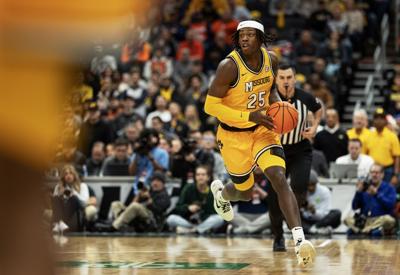
Missouri guard Mark Mitchell surveys the defense in the first half of the Braggin’ Rights game against Illinois on Sunday, Dec. 22, 2024, at Enterprise Center.
COLUMBIA, Mo. — Time refuses to pass dully in college sports now.
If there isn’t something happening on a court, there’s something going on in court. There’s more money, fewer rules and much ado about all of it.
With a changing landscape as the backdrop, another year in University of Missouri athletics chugged on by.
From a men’s basketball team that rebounded (metaphorically) its way into the NCAA Tournament and a football team that fell just a bit short of the postseason to the first full year of a new athletics director, these were the five biggest Mizzou stories of the past year:
Men’s hoops back in March Madness
Dennis Gates’ second season leading the Tigers had been abysmal, but Year 3 of his tenure saw one of the best bounce-back campaigns college basketball has ever seen.
People are also reading…
With newcomer Mark Mitchell as the leading scorer and guard tandem Caleb Grill and Tamar Bates packing a veteran punch, Mizzou went 21-10 through the regular season and 10-8 in Southeastern Conference play — a far cry from 0-18 the year prior.
Missouri was ranked as high as No. 14 in The Associated Press poll, a byproduct of big wins like a December takedown of top-ranked Kansas and a home-court defense against high-octane Alabama.
That victory over the Crimson Tide proved to be the season’s peak, though. A sluggish end to the regular season set the stage for an upset loss in the first round of the NCAA Tournament, where No. 6 seed Mizzou fell to No. 11 seed Drake.
The year ahead: Mitchell and point guard Anthony Robinson II will be back as the team’s nucleus for 2025-26, and a relatively low-key transfer portal window prioritized adding complementary pieces to that core. Will they be able to carry the Tigers to the postseason once again?
Football wins 10 games but misses CFP
There are two sides to the MU football coin.
On one hand, Eli Drinkwitz and Co. won 10 games for the second season in a row, a feat that had only been done twice before in program history. That included Brady Cook’s “hospital game“ homecoming victory against Auburn, a chaotic final few minutes against Oklahoma and a Music City Bowl win over Iowa.
The Tigers spent almost the entire season ranked, opening at No. 11 and climbing as high as No. 7 before falling off top-tier pace.
On the other hand, there was a gap between Mizzou’s potential and reality wide enough to keep the program out of the inaugural 12-team College Football Playoff despite a very realistic path to make it. A shellacking at Texas A&M, meltdown at Alabama and inept tackling at South Carolina proved costly. Take one of those three out of the equation, and the season would’ve looked much more clearly positive.
The year ahead: The Cook era is over. Whether it’s Penn State transfer Beau Pribula or perennial prospect Sam Horn at quarterback, the Tigers will rely on new talent to chase an unprecedented third consecutive double-digit win season.
Gymnastics takes 3rd in nation
No MU program has better national standing right now than the Tigers’ gymnastics squad, which finished third in the nation at the NCAA championships.
The team got to the final day of the season by sweating out narrow margins, even by gymnastics standards, late in meets.
Helen Hu, back after a year away from the sport, won the individual national title on balance beam.
The year ahead: Coach Shannon Welker has proven he can meld transfers with talented recruiting classes, and even with one such generation headed out the door, he’s likely to keep Missouri gymnastics in the national discussion.
Laird Veatch’s first year as AD
Technically, Laird Veatch started as Mizzou’s athletics director shortly before the end of the previous sports year, but 2024-25 was functionally his first time around the block in the big chair.
With generating revenue as an emphasis, he quickly recruited sponsors for logos on the football field and, near the conclusion of football season, explained why MU needed to raise prices for season tickets.
Veatch also made his first coaching hire (more on that in the next section), but much of his first year seemed to be about building a foundation for the 2025-26 cycle, when the expected onset of revenue sharing with athletes will bring a major shift to college sports.
The year ahead: Generating revenue will be no less important for Veatch and his department. How Mizzou distributes money and performs during the first year of revenue sharing — assuming it does come into effect — will be worth following. Depending how next spring goes, he may have personnel decisions to make around Missouri’s baseball and softball coaches. And by this time next year, renovations to Memorial Stadium should be entering the home stretch.
Women’s basketball coaching change
Fair or not, much of the women’s basketball season seemed like a march toward the inevitable end of Robin Pingeton’s time coaching the Tigers. Her contract expired at the end of the season, when her Tigers finished 14-18, and she agreed to depart a few weeks early to allow Mizzou a head start on its coaching search — and her own hunt for a new job.
Missouri hired Kellie Harper, the former Tennessee coach who was the most proven free agent on the market, with NCAA Tournament appearances at four schools and three runs to the Sweet 16.
The year ahead: Even in the quick-roster-build age, a transitional year for Harper will be forgiven. Ideally, her Tigers will improve on the three SEC wins of this past season. Making the NCAA Tournament in her debut campaign would be an immediate success.














